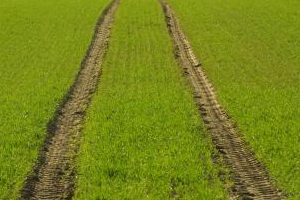Lawn Care
Turf grasses are typically exotic monocultures: in other words, they consist of a single species, which is often not native to the area where they are planted. The widespread use of turf grasses has lead to a number of environmental concerns. If your employer has a preference for a conventional lawn, you can show him that the application of chemical fertilizers, pesticides and herbicides are not necessary: there are many healthier practices that will result in a beautiful turf grass lawn.

Mow Lighter
Bigger machines might be quicker, but lighter mowers cause less compaction and are better for the lawn.

Never Mow on Wet Soil
Never mow after rain or on soft ground. It damages the soil and creates unwanted compaction,
which is difficult to restore.

Aerate the Soil
If your soil is compacted the best time to aerate is in the fall. Aeration improves root growth, drainage and seed-germination.

Keep it Alive
Don’t use pesticides and synthetic fertilizers. They kill the natural organisms that nourish and protect the soil.

Mow The Leaves
Mow the leaves on the lawn. The leaf mulch will decompose and break down to protect and nurture the soil.

Mow High
Let grass grow up to 4 inches. Longer grass can better shade its roots, conserve moisture and keep out weeds.

Leave The Clippings
Leave grass clippings, after mowing, on the lawn. The clippings will break down to provide nutrients for the grass.

Shred it Small
Don’t cut too much at one time. Avoid thatch with shorter clippings and mulch clippings as small as possible.

Water Less but Deep
Water less often but longer. One inch per week is usually sufficient. The roots will grow deeper and stronger.

Outcompete Weeds
Hand dig weeds you really can’t stand. Spray only organic weed killers. Overseed to avoid more weeds.

Fix Problems
For big problem areas, test the soil. Wait for the results and replenish the soil with certified organic supplements.

Mixed Grass Seed
Seed in early fall or spring with a mix of grasses. Restore bare spots with a combination of seed and composted soil.

Organics Kill Too
Organic pesticides are still pesticides and can be equally toxic for beneficial insects.
Try to avoid them.

Fight Bugs with Bugs
Encourage a robust insect and wildlife population in your yard. A natural balance is the best means to avoid garden pests.

Use Nematodes
Nematodes and bacteria are small organisms that can kill specific species. They are safe, effective pest management.
Keep It Natural
A healthy lawn will endure drought, diseases, and pest infestations better than a stressed lawn, and healthy grasses will compete better with undesirable weeds, so the best way to avoid using chemicals is to build up a healthy lawn, naturally.
Tips For Healthier Lawns
- Nourish the soil. Don’t use pesticides and synthetic fertilizers because they kill the natural bacteria and fungi that nourish your soil and protect you plants.
- If needed, aerate in the fall. Core and slice aeration of the soil before seeding will improve germination and alleviate compaction.
- If you have problem areas, test the soil and replace what is missing with organic supplements.
- Leave grass clippings on the lawn. The clippings will break down to provide nutrients to the soil.
- Mow fallen leaves on your lawn. Just like grass clippings leaves break down and provide the soil with nutrients.
- If you water too often the roots of the grass will remain shallow and become more vulnerable to drought and drainage issues.
- Seed in the fall or early spring to outcompete weeds in the growing season.
- If needed, fertilize with mature compost in fall.
- Don’t be bothered by a few flowers in the lawn. Just dig them up or pull the weeds you really can’t stand.
- Use an organic corn gluten product to prevents weed seeds from germinating on established lawns.
- Don’t rush, it might take some seasons to cure a sickly area.
- Fill bare spots with a mixture of compost and grass seed.
- Mow high. Let grass grow to 4 inches allowing it to shade its roots, conserve moisture and keep out weeds.
- Keep mower blades sharp so they do not tear the grass, making it vulnerable to disease.
- Control pests without chemicals. The best pest control is predator bugs and birds. Most insects are beneficial. If you encourage a robust insect population in the yard, nature will find a balance and pests will be easier to control.
- Try to control lawn pests, like grubs, sod webworms, and chinch bugs with applications of beneficial nematodes or spores.
